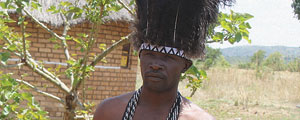
SHAMVA – Although a number of young Pentecostal preachers are believed to have accrued wealth through preaching the gospel of prosperity, the same is true of those using traditional occult powers to “help” the afflicted. Report by Phillip Chidavaenzi
David Mudimu (38), who hails from Chief Chitsungo’s area in Guruve and leads a team of five young men, including Kelvin Moyo (33), is one such witchhunter, known in common parlance as tsikamutanda.
His fame has spread like wild fire, with people in Kunaka, Madhake, Mashambanhaka, Masere and Guhwa Villages speaking glowingly about his stunning exploits, and how these have fattened his wallet.
Moyo told NewsDay people to whom they extend help were often required to part with at least one beast, depending on the magnitude of life issues they wanted resolved. Those without livestock paid the equivalent in cash, or else they would continue having the demons they wanted exorcised stalking them.
“If someone paid four head of cattle or more to acquire a goblin, why should they pay me just a chicken for destroying those things when they become problematic?” Moyo quipped, before tearing off a piece of roasted meat with his teeth.
Moyo said his team only worked in villages where they would have been invited. Upon arrival in a village they planted a peg — a thick carved wood believed to paralyse any form of black magic in the village — at the headman’s homestead.
Villagers have started jokingly referring to this peg as a “booster” because they said it could read the evil network in any village, the manner in which mobile telephone boosters assured the availability of phone network in an area.
“Some people have been made to pay $300 or as much as a beast for help,” said Harare-based Sebastian Mutero Rusike, who had come to his village when NewsDay first arrived.
- Chamisa under fire over US$120K donation
- Mavhunga puts DeMbare into Chibuku quarterfinals
- Pension funds bet on Cabora Bassa oilfields
- Councils defy govt fire tender directive
Keep Reading
“The young men (tsikamutanda’s team) only eat chicken while the rest of the villagers have goat meat, before they start working.”
Rusike said he was happy that the witchhunters had come to purge his rural home of the evil, spreading like a malignant cancer.
“He (Mudimu) can easily call you by name and tell you problems you are facing even before you open your mouth,” he said.
Fidelis Tinarwo, one of the first villagers to get help, said he had had sleepless nights for months, as he heard strange things moving about in his house.
“I would wake up around midnight, light a fire in the kitchen and sit there until morning,” he said, adding that he did not know where the things came from.
Although Moyo sounded very conservative, some villagers said witchhunters charged as much as $200 if someone whose life was plagued by bad luck wanted to be cleansed.
As standard procedure, Moyo said they informed the police before they started working in an area, in case something went wrong. “We present our letters of authority from Zinatha,” he said. “We don’t have to have a written letter from the police, but we inform them of our presence.”
He said since they stepped into Shamva, they had established that commonly used charms include nyanga (horn), divisi (farming charms) and madumwa (goblins).
Incredible tales about witchhunters’ exploits abound, with the line between fact and fiction almost non-existent. NewsDay was informed upon arrival that one widow who lost four of her five children was exposed as having killed them herself and made the only remaining child mentally retarded. The community is said to have pitied her and helped whenever possible, but learnt the shocking truth after tsikamutanda’s arrival.
Attempts to trek down the said family, however, led to a dead end. Moyo, however, could not confirm the incident, but pointed out that some claims needed to be taken with large helpings of salt.
“I am not aware of that particular case,” said the soft-spoken Moyo. “But of course, when things like these happen, people have a tendency to exaggerate.”
Casper Mutize, from Guhwa Village said he never used to believe witchhunting tales, but what he had seen and heard in recent weeks had made him a “believer”.
He said: “Some of the scary things that have been retrieved from people’s homes and burnt and some of the culprits’ confessions can only make you revise your thinking.”
Headman Godfrey Guhwa said tsikamutanda operated just like a pastor, whose role was to show people the good and the bad so they could make informed choices.
“These people have been a great help to children whose parents left goblins in the house and the children didn’t know what to do,” he said. “So in a way, they are helping to ease people’s burdens.”
Headman Guhwa, however, said although some people perceived the charges as high, they were much cheaper than the cost of having goblins tear one’s family fabric to shreds.
“You will be in a situation where you don’t know what to do. So he has come to deliver those who need deliverance,” he said, citing the case of a villager whose children all died due to his goblin. When NewsDay visited the villager’s homestead, he was not at home, but it was confirmed that all nine children with his first wife, had died, and were all buried in the homestead. Reports said a huge live reptile was retrieved from his bedroom, together with small gourds filled with blood, corresponding to the number of his late children.
In their line of business, Moyo said, it was easy to cross someone’s path, so they lived on what he called “grace”.











